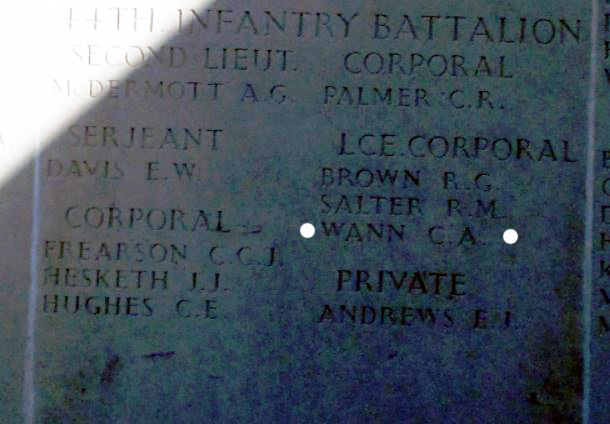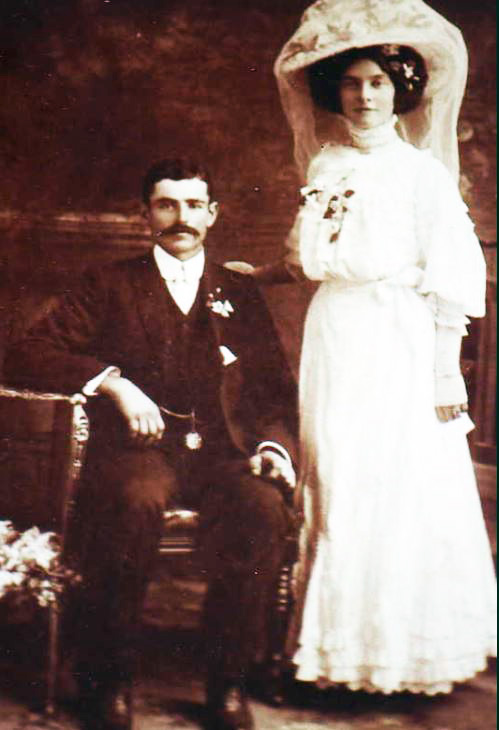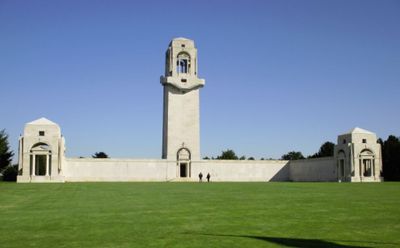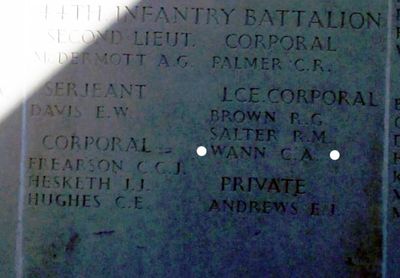Difference between revisions of "Charles Alexander Wann"
From Our Contribution
| Line 1: | Line 1: | ||
{{Infobox | {{Infobox | ||
| − | | name = Charles | + | | name = Charles Alexander Wann |
| − | | title = | + | | title = Charles Alexander (aka Alex) Wann |
| above = | | above = | ||
| subheader = | | subheader = | ||
| − | | image = [[File: | + | | image = [[File:Wann_Charles_Alexander.jpg]] |
| caption = | | caption = | ||
| − | | image2 = | + | | image2 = [[File:Wann_wedding.jpg]] |
| caption2 = | | caption2 = | ||
| Line 19: | Line 19: | ||
| label2 = Date of Birth | | label2 = Date of Birth | ||
| − | | data2 = unknown | + | | data2 = unknown 1883 |
| label3 = Place of Birth | | label3 = Place of Birth | ||
| Line 88: | Line 88: | ||
==Pre War== | ==Pre War== | ||
| − | Electoral Roll entry 1906, Bullsbrook, farmer ; 1917 labourer. Parents in Seventh road Armadale 1903 - 1925, father a sleeper cutter. | + | Electoral Roll entry 1906, Bullsbrook, farmer ; 1917 labourer. Parents in Seventh road Armadale 1903 - 1925, father a sleeper cutter. Charles was a widower with his wife (Charlotte Warren 1891 - 1912) and baby son dying in childbirth during 1912. |
==War Service== | ==War Service== | ||
| − | Address on enlistment was Bullsbrook, | + | Address on enlistment was Bullsbrook. Three weeks after entering Blackboy Hill, Charles was allocated to the 6th reinforcement draft for the 44th Battalion and travelled with them to Devonport in England. |
| − | + | On arrival in England he spent a week in Sutton Mandeville before joining the 11th Training Battalion at Larkhill. Training completed, he proceeded overseas to France via Folkestone on 2 Jul 1917, and was taken on strength of the 44th Battalion on 18 Jul 1917 near Messines. | |
| − | |||
| − | On arrival in England he spent a week in Sutton Mandeville before joining the 11th Training Battalion at Larkhill. | ||
| − | On 8 Aug 1917 Charles was appointed Temporary Lance Corporal, and this was confirmed on 30 Aug 1917. On 12 Oct the 44th Battalion were in reserve east of Ypres where the Australians were being asked to attack the Germans at Passchendaele in appalling weather conditions. During October, the 44th Battalion suffered 337 casualties, Charles being one of them. | + | On 8 Aug 1917 Charles was appointed Temporary Lance Corporal, and this was confirmed on 30 Aug 1917. On 12 Oct the 44th Battalion were in reserve east of Ypres where the Australians were being asked to attack the Germans at Passchendaele in appalling weather conditions. During October, the 44th Battalion suffered 337 casualties, Charles being one of them on the 12th near Poperinghe. |
He was first seen by the 11th Field Ambulance with a GSW to his right eyebrow, before passing back to the 46th Casualty Clearing Station and then admitted to the 2nd Convalescent Depot in Rouen on 14 Oct 1917. On 22 Oct he was transferred to the 11th Convalescent Depot before being discharged to base units on 5 Nov 1917. | He was first seen by the 11th Field Ambulance with a GSW to his right eyebrow, before passing back to the 46th Casualty Clearing Station and then admitted to the 2nd Convalescent Depot in Rouen on 14 Oct 1917. On 22 Oct he was transferred to the 11th Convalescent Depot before being discharged to base units on 5 Nov 1917. | ||
| − | On 17 Nov 1917 he was able to rejoin the 44th Battalion. He remained with them until 5 Jul 1918 when he reported ill with a septic right knee that needed treatment, and was seen first by the 13th Field Ambulance, and then passed back to the 47th Casualty Clearing Station, | + | On 17 Nov 1917 he was able to rejoin the 44th Battalion which was in "Bulford Camp" a rear training area south-west of Hazebrouck. He remained with them until 5 Jul 1918 when he reported ill with a septic right knee that needed treatment, and was seen first by the 13th Field Ambulance, and then passed back in succession to the 47th Casualty Clearing Station, the 5th General Hospital in Rouen, and on 9 Jul 1918 to the 72nd General Hospital in Trouville. |
| − | On recovering, he returned to the 44th Battalion, | + | On recovering, he returned to the 44th Battalion, finding them on 12 Sep 1918 at Doingt on the southern outskirts of Péronne. On 29 Sep 1918 the 44th Battalion took part in the second phase of an attack on the St Quentin Canal sector. As the first phase carried out by American troops had failed to make safe the start point, the battle broke down into desperate battles between small groups of Australians around enemy strong points. This continued for 3 days, and it was during this period that Charles was killed. |
<div><ul> | <div><ul> | ||
| Line 131: | Line 129: | ||
[[Category:Church of England]] | [[Category:Church of England]] | ||
[[Category:Labourer]] | [[Category:Labourer]] | ||
| + | [[Category:Armadale-Kelmscott]] | ||
Revision as of 02:21, 26 March 2018
 | |
 | |
| Personal Information | |
|---|---|
| Date of Birth | unknown 1883 |
| Place of Birth | Canobolas, Orange, New South Wales |
| Death | 30 Sep 1918 |
| Place of Death | St Quentin Canal, France |
| Age at Enlistment | 32 years 10, months |
| Description | 5'7½" (1.71m) tall; weight 160 lbs (72.6 kg); fresh complexion, brown eyes, black hair. |
| Occupation | labourer |
| Religion | Church of England |
| Address | NOK Armadale, Western Australia |
| Next of Kin | Father Mr Charles Wann |
| Military Information | |
| Reg Number | 2901 |
| Date of Enlistment | 16 Oct 1916 |
| Rank | Lance Corporal |
| Unit/Formation | 44th Battalion, 6th Reinforcement / 11th Brigade, 3rd Division |
| Date of Embarkation | 29 Dec 1916 - 3 Mar 1917 |
| Ship Embarked On | HMAT A34 Persic |
| Fate |
Wounded in Action 12 Oct 1917 at Passchendaele Killed in Action 30 Sep 1918 at St Quentin Canal |
| Monument | Villers-Bretonneux Memorial |
| Medals |
British War Medal Victory Medal |
Contents
Pre War
Electoral Roll entry 1906, Bullsbrook, farmer ; 1917 labourer. Parents in Seventh road Armadale 1903 - 1925, father a sleeper cutter. Charles was a widower with his wife (Charlotte Warren 1891 - 1912) and baby son dying in childbirth during 1912.
War Service
Address on enlistment was Bullsbrook. Three weeks after entering Blackboy Hill, Charles was allocated to the 6th reinforcement draft for the 44th Battalion and travelled with them to Devonport in England.
On arrival in England he spent a week in Sutton Mandeville before joining the 11th Training Battalion at Larkhill. Training completed, he proceeded overseas to France via Folkestone on 2 Jul 1917, and was taken on strength of the 44th Battalion on 18 Jul 1917 near Messines.
On 8 Aug 1917 Charles was appointed Temporary Lance Corporal, and this was confirmed on 30 Aug 1917. On 12 Oct the 44th Battalion were in reserve east of Ypres where the Australians were being asked to attack the Germans at Passchendaele in appalling weather conditions. During October, the 44th Battalion suffered 337 casualties, Charles being one of them on the 12th near Poperinghe.
He was first seen by the 11th Field Ambulance with a GSW to his right eyebrow, before passing back to the 46th Casualty Clearing Station and then admitted to the 2nd Convalescent Depot in Rouen on 14 Oct 1917. On 22 Oct he was transferred to the 11th Convalescent Depot before being discharged to base units on 5 Nov 1917.
On 17 Nov 1917 he was able to rejoin the 44th Battalion which was in "Bulford Camp" a rear training area south-west of Hazebrouck. He remained with them until 5 Jul 1918 when he reported ill with a septic right knee that needed treatment, and was seen first by the 13th Field Ambulance, and then passed back in succession to the 47th Casualty Clearing Station, the 5th General Hospital in Rouen, and on 9 Jul 1918 to the 72nd General Hospital in Trouville.
On recovering, he returned to the 44th Battalion, finding them on 12 Sep 1918 at Doingt on the southern outskirts of Péronne. On 29 Sep 1918 the 44th Battalion took part in the second phase of an attack on the St Quentin Canal sector. As the first phase carried out by American troops had failed to make safe the start point, the battle broke down into desperate battles between small groups of Australians around enemy strong points. This continued for 3 days, and it was during this period that Charles was killed.
Notes
Memorialised at VILLERS-BRETONNEUX MEMORIAL. WANN, Lance Cpl Charles Alexander, 2901, 44th Bn. 30 Sep 1918. Age 36. Son of Charles and Mary Ann Wann of Armadale, Western Australia. Born at Canobolas, NSW

